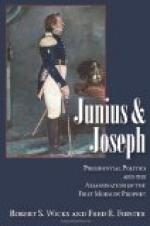To the unspeakable joy of his followers, Joseph Smith appeared suddenly in Quincy. It appeared to be true, as Darling said, that the Missouri authorities could in fact find no charge on which to try him.
Smith, with his brother Hyrum and their fellows, had suffered severely, but later their confinement had been more easy, and the news of the triumphant gathering of his people, together with the excitement of the escape, had induced in Smith a mood which spurned past failures with a foot that sped to a new goal. The acclamation, the sincere and touching joy, with which Smith was received by men and women and children, were enough to raise any man in his own esteem, and to set free the ambition which had been perhaps drooping in confinement.
Smith had not been in Quincy twenty-four hours before he mastered the situation there in all its details. He promptly sent out a decree against the new doctrine of what he called “lax manners.” He preached a great sermon in the open air that night. “A man shall kiss his own wife and daughters and no other women,” said Smith. The elders who had preached from St. Paul’s texts on the subject were accused of error and called upon to recant. Smith commanded that the women should work and the children should study, and he publicly pronounced Susannah to be a fitting model for the women and a fitting teacher for the young. Susannah had not as yet met Smith face to face when she found herself made, as it were, an object of licensed admiration.
CHAPTER XVI.
It was that same evening, after Smith’s commendation of Susannah, that Darling decided to lay the destruction of her letter before the prophet, hoping for approval.
Smith was looking over Darling’s accounts in the tithing office, giving voluminous and minute directions. The May night had closed in. The men were in a corner of the large shed in which the stores were kept, a corner fenced off for an office by a low wooden partition. The candle flickered on the table between them.
The business side of Smith’s soul was uppermost. He had power to keep in mind a huge number of details, and to classify them, and he estimated the relative importance of the classes as no other man would have estimated it.
Darling interrupted before Smith’s interest in business began to wane. He prefaced his communication concerning Susannah by speaking of the much shepherding needed by the sheep. Some, he said, had done worse than be lax in manners; some had presumed to have revelations; some had doubted the faith.
Here Darling paused, feeling sure of rousing Smith to the mood he desired.




